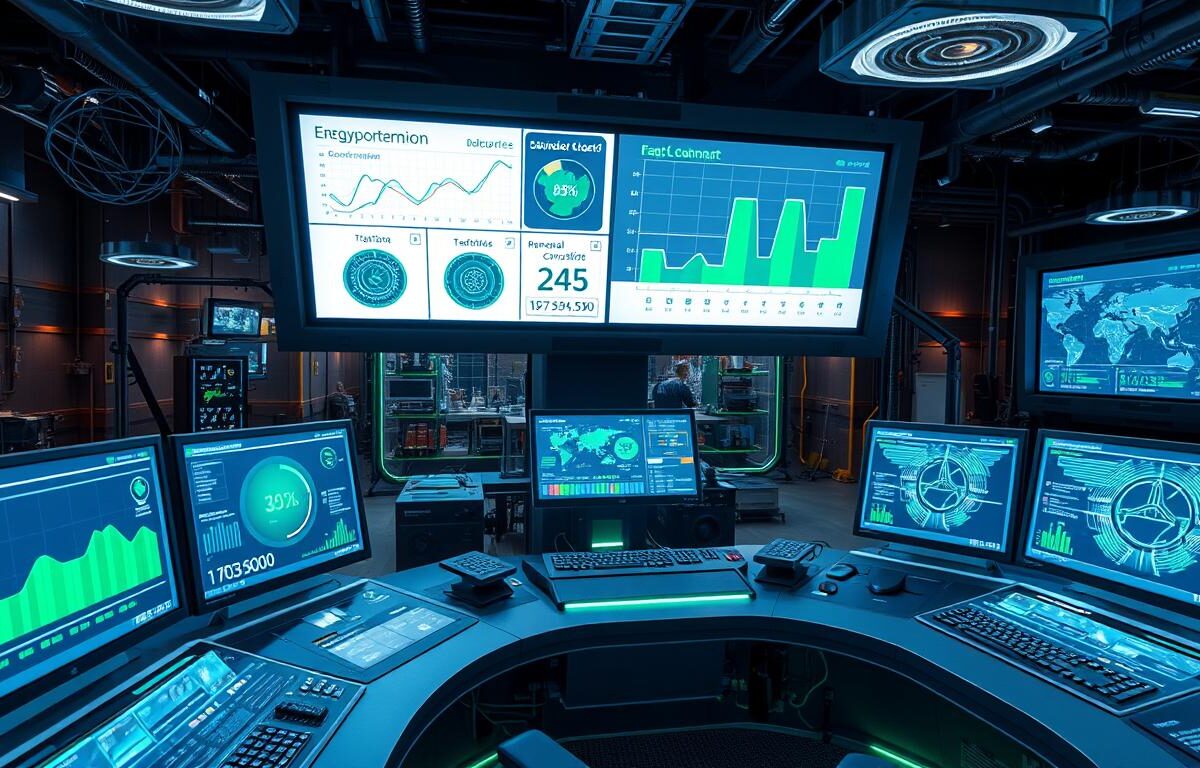The energy sector is facing big changes. This is because of the urgent need to act on climate change and new technology. Software for energy and utilities is at the core of these changes. It helps with industry struggles, meeting standards, and moving towards smart management of assets and workforce.
Companies like IFS are leading the change. They offer top-notch management of enterprise assets and have earned praise from Gartner®. They have helped cut operational costs and boost power generation. But it’s not just about adding new tech. It’s about making a digital change for better growth and competitive strength.
The digital change in the utilities industry is crucial. IFS is showing its value, helping companies all over see the benefits of their energy software. This software makes processes smoother and gives companies an edge. Leaders in the industry have saved 20% on costs on average. Plus, a large global network of users shows the wide appeal of these advanced software solutions.
Key Takeaways
- IFS Cloud is pivotal for the digital transformation in the energy and utilities sector.
- EAM energy software by IFS maximizes efficiency and optimizes operations.
- Energy companies benefit from reduced operational costs and enhanced competitiveness.
- IFS’s enterprise software excels in rigorous environments, such as offshore drilling.
- IFS’s software solutions are praised for their global scalability and industry alignment.
- Using IFS software contributes to substantial energy conservation and cost savings for customers.
Understanding the Role of Software in Energy and Utilities
Advanced software is changing the energy and utilities sectors for the better. It uses powerful energy data analytics and management systems. These technologies impact how data is managed, improve operations, and help meet regulations.
The Importance of Data Management
Modern utilities depend on effective data management, thanks to strong management systems. These systems gather and analyze big datasets from energy production to customer delivery. With energy data analytics, they offer insights that improve resource use and forecasting.

Enhancing Operational Efficiency
Software technologies are helping leaders worldwide, like SDIC Qinzhou Electric Power and Dolphin Drilling. They use utility management systems and energy management software to make their operations smooth. This tech lets them monitor and manage work in real time, which is essential in the challenging energy sector.
Regulatory Compliance and Reporting
As rules in the energy sector get tougher, having good compliance tools is key. Energy management software makes meeting standards easier. It helps companies avoid risks from not following rules. It automates reports, cutting down human mistakes and improving report reliability for regulatory organizations.
| Feature | Benefits | Impact on Industry |
|---|---|---|
| Real-time Data Analytics | Immediate insights into operational metrics | Enhances rapid decision-making and reduces downtime |
| Automated Compliance Reporting | Streamlines regulatory processes | Improves compliance rates and reduces penalties |
| Resource Management Optimization | Optimal use of assets and reduction in waste | Leads to cost savings and sustainable growth |
Types of Software Solutions Available
The energy sector is changing fast with new software that helps make things run smoother. These improvements use technology like utility billing software, demand-side management software, and smart grid technology. They solve special problems in this field.
Utility Management Systems
Utility management systems cover many areas, from making products to billing customers. They include advanced billing, managing customer data, and providing services. Such software is key for billing and answering customer questions right.
For example, utility billing software makes sure bills are right. It also helps save money in the long run and increases income security.
Customer Relationship Management (CRM) Software
In today’s world, good customer service sets energy providers apart. CRM software is very important here. It helps utilities take care of customer interactions and support. CRM solutions make the customer experience better and improve service.
Asset Management Tools
Managing physical assets well is important for keeping systems reliable and costs low. Asset management tools make maintaining things easier, help stuff last longer, and tell you when things need replacing. This keeps the investment in infrastructure valuable.
Energy Management Solutions
Energy management solutions are central to managing energy use wisely. With smart grid technology, they provide instant data. This helps stop waste and share energy better. It’s key for creating smart cities that can handle future challenges.
| Technology | Usage | Benefits | Example Providers |
|---|---|---|---|
| Utility Billing Software | Revenue Assurance | Cost Savings | Oracle |
| Demand-Side Management Software | Energy Conservation | Efficiency Optimization | Schneider Electric |
| Smart Grid Technology | Real-time Monitoring & Control | Enhanced Electricity Distribution | GE Digital |
By using these technologies, energy companies become more innovative. They can also meet the needs of customers better and follow strict environmental rules.
Choosing the Right Software Solution
Choosing the best renewable energy software and energy efficiency solutions is crucial. There are many things to think about to make sure they work well in the energy sector. These tools offer great chances for companies to become more efficient and perform better.
Key Features to Consider
Key parts of utility software include tracking, monitoring assets, and working with sensors. Tools like Mitratech’s TeamConnect and LegalHold show that using automation and managing data well can make operations smoother and cheaper. These benefits are key for managing energy and utilities today.
Scalability and Flexibility
It’s very important for energy companies to use software that can grow and change easily. This means the software must work well even as the company takes on more tasks or data. This flexibility helps the company expand without making things too complicated.
Integration with Existing Systems
The ability of renewable energy software to work well with what’s already there is very important. Good energy solutions fit smoothly with current systems, from billing to managing customer relationships. This helps make the whole operation more efficient and cost-effective.

Picking the right software for managing energy and utilities matters a lot. It can really affect how well and how cheaply a company operates. Mitratech’s software, for example, offers all you need. It makes managing assets and data easier, helping companies stay competitive.
Benefits of Implementing Software Solutions
Integrating energy project and asset management software and enterprise resource planning is changing the energy sector. This change isn’t small. It’s a big shift in how businesses work and help their customers. This leads to better efficiency and more money made.
These software tools allow for quick access to data and detailed analytics. This is key for making smart choices and planning well in the busy utility markets.
Improved Decision-Making
With these tools, companies can see what’s happening now and guess future events. Custom software development helps them understand energy use and find problems in their systems. This means they can fix issues before they become big problems.
Cost Reductions and Increased Profitability
Enterprise resource planning and energy project and asset management software can greatly reduce costs. Utility companies have saved up to 30% in just the first year after starting to use ERP systems. This big drop in costs comes from using resources better and making workflows smoother.
Enhanced Customer Experience
Happy customers keep coming back, and how they are treated matters a lot. New software gives utilities better ways to serve customers. This means more accurate bills and CRM systems that predict what customers will need. Better service makes customers trust and stick with a company.
Using advanced software like energy project and asset management software and enterprise resource planning changes the game for utility companies. It leads to better work and happier customers. These tools don’t just help now, but also set up a strong base for growth and new ideas in this important industry.
Future Trends in Energy and Utilities Software
The energy and utilities sector is entering a new era. This era is marked by technological advancements and environmental goals. A key change is the use of advanced software to manage these new challenges.
The Rise of Artificial Intelligence
Artificial Intelligence (AI) is now crucial in the energy field. It improves predictions and helps identify trends. This makes operations and customer service better. AI, especially Gen AI, is enhancing efficiency, sustainability, and services. It does this by analyzing energy use, preventing equipment breakdowns, and offering deep market insights.
Cloud Computing and Its Impact
Cloud computing is transforming the sector with its computational power. It enables detailed analysis of renewables, weather, and supply-demand scenarios. Cloud solutions improve resource use and save money. Services like Oracle Energy and Water lead with tools that analyze vast data and bring financial gains.
Sustainability and Environmental Considerations
Sustainability is central to energy and utilities software now. Companies are working to be more efficient and positively affect the climate. They aim to meet big energy-saving goals. There’s also big funding for battery storage, growing over 89%. This shows a move towards better energy storage. By the year’s end, U.S. battery storage capacity could top 30 GW. This makes a sustainable, efficient grid more attainable.
FAQ
What are software solutions for energy and utilities?
Software solutions for energy and utilities are tools that help companies manage their work better. They are used in different areas like keeping assets in good shape, serving customers well, understanding data, and following rules. These tools help companies deal with challenges, change with the times, and stay ahead in a changing market.
How does energy management software improve data management?
Energy management software makes it easier to handle, analyze, and report on lots of data. This data is about the company’s assets and how they are maintained. With it, companies can understand their work better, make smarter choices, and improve how they operate by using data effectively.
What are the benefits of enhancing operational efficiency with utility management systems?
Utility management systems make operations smoother. This leads to better work processes, lower costs, and growth. By connecting different areas of work, these systems make resource use and workflows more efficient, raising performance and profits.
Why is regulatory compliance and reporting critical in the energy sector?
The energy sector has strict rules. Companies must follow these to work legally and keep their licenses. Software for compliance helps handle complex reporting and ensures companies meet all rules, avoiding fines and legal trouble.
What are the different types of utility billing software available?
Utility billing software comes with varied features. These include handling customer data, processing payments, and making accurate bills based on use. Some advanced software also supports adjusting to customer needs and works with smart grids for real-time billing and insights on energy use.
How do CRM systems benefit utility providers?
CRM systems help utility providers improve how they interact with customers. They assist in managing talks, services, and issues. CRM also gives detailed insights into what customers like and their feedback, leading to personalized services and happier customers.
Why are asset management tools important for energy and utilities companies?
Asset management tools keep energy and utility company assets working well for longer. They help with regular upkeep, tracking assets, and managing their life cycle. This reduces downtime and operational issues, and makes equipment and infrastructure last longer.
What are the elements of an energy management solution?
An energy management solution includes monitoring energy use in real time, using advanced analytics to find savings, and controlling usage. These help meet sustainability goals by cutting energy waste and promoting efficient use of energy.
What key features should be considered when selecting energy efficiency solutions?
In choosing energy efficiency solutions, look for tracking of asset upkeep, customizable data systems, and analytics for energy use and efficiency. These help keep operations up to par while reducing energy use and environmental impact.
How do scalability and flexibility enhance renewable energy software functionality?
Scalability and flexibility in renewable energy software let it grow and change with needs. This means it can handle more work and adjust to new situations without losing quality. These features make the software more useful for different energy projects.
What role does system integration play in the utility management system selection?
When choosing a utility management system, system integration is key. It makes sure new software works well with what’s already there. This keeps everything running smoothly, helps share data across systems, and supports better choices with enhanced analytics.
How do software solutions contribute to improved decision-making in the utilities sector?
Software solutions offer real-time data and analytics. This helps utilities quickly adapt to demand changes, use resources wisely, and plan investments. Better visibility into operations leads to more accurate and smarter decisions.
What impact do software solutions have on cost reductions and profitability in energy and utilities?
Software solutions boost operational efficiency, automate processes, and offer better data for planning. These improvements can save money, reduce waste, and increase profits for energy and utilities companies.
Can utility management software improve customer experience and how?
Yes, utility management software can better customer experience by offering accurate billing, customized service, swift problem solving, and engaging customers proactively. These improvements build trust and satisfaction, leading to more loyalty and growth.
What is the potential impact of artificial intelligence on the future of energy sector software?
Artificial intelligence in energy software could bring better predictive analytics for upkeep, automated systems for energy sharing, and clearer usage patterns. AI promises smarter grids, efficient renewable energy management, and better use of resources.
How does cloud computing influence energy data analytics?
Cloud computing gives the power to process big data from the energy sector. It allows for faster, more accurate analysis, complex models for weather and use, and helps companies use big data for planning.
Why are sustainability and environmental considerations increasingly important in utility software development?
Sustainability in software development matches global goals against climate change and promotes smart resource use. Software that supports these goals helps companies lower their environmental effect, follow green laws, and show their commitment to sustainability and efficiency.



